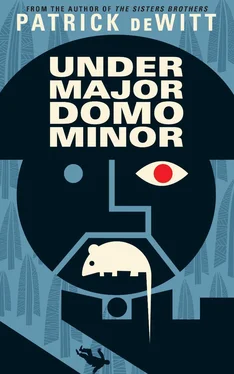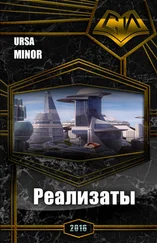Alexander sensed the change in his partner’s mood, and felt calmer for it. Allowing his mind to drift, he fell to thinking of the difficulties of his youth: his mother dead mere months after his birth; his father, waylaid from sorrow, vanished one autumn morning, never to return, never sending word. From the start Alexander was instilled with the knowledge that whatever shape his life took, it was up to him alone to sculpt it, and so to have risen to the level of engineer, he couldn’t help but feel proud of himself. Surely this is understandable, but half an hour shy of Bury, he made the mistake of verbalizing his satisfaction: “My maiden voyage as engineer,” he said. “I can’t deny it, but it feels good.” He turned to Eirik, who said nothing, but looked stonily ahead. Alexander said, “Won’t you allow me a moment of boasting, old friend?”
“Boast away,” Eirik said. “I won’t stop you.”
“Why can’t you be happy for me?”
“Who’s to say I’m not?”
“But how would I know if you were?”
Eirik jammed the spade in the coal tender. “What do you want me to do?” he asked.
Alexander became sheepish. “Typically, when a man has a turn of good luck, his fellows will offer their congratulations.”
At this last word, Eirik’s black mood returned, a virulent poison which leached through to the deepest parts of his soul. Alexander’s neck looked velvety soft to the touch, and Eirik’s fingers began to twitch and grip. He resumed his feverish shovelling and as the train barrelled along the rails he waited for his hatred to ebb, but it never did, and in fact it only doubled and redoubled, so that he felt lost to it. Resignedly, he waited for the best moment to exorcise this feeling.
The train eased into the station at Bury. Alexander peered out, an attitude of calm defining his person. He turned to Eirik, meaning to offer some minor encouragement or compliment, when he saw his co-worker was watching him with a fanatical look, his eyes dreadful, grotesquely transformed. The look made Alexander wary, and he asked, “What’s the matter?”
“You want me to congratulate you?” Eirik asked.
“Don’t you feel it’s in order?”
“Indeed it is. But you’re certain you want me to?”
What manner of test was this? Would Eirik strike him with a fist? Well, then, better to have it out. Alexander was a healthy man, if portly, and had seen his share of tavern battles — he was not afraid of the stingy wretch who stood before him. Resting his hand on the brake lever and gripping it in his fist, he struck an upright and confident pose, and said, “I’m certain, Eirik. Let’s have it.”
The spade stuck out an angle from the coal tender. Later, speaking to his cellmate, Eirik would muse that it was as if the spade were leaning towards him, offering itself for assistance. He swung it in a quick, tight circle, bringing the edge down on Alexander’s hand, severing cleanly the man’s foremost three fingers, while the fourth hung as if on a hinge. This swayed up and back and Alexander stood there watching the blood drain from the stumps with the look of a man who had just witnessed a baffling illusion.
“Congratulations,” Eirik said. He collected the fingers with the spade and tossed them into the churning firebox.
Lucy knew none of this, and would never know. By the time he arrived at the station Alexander had been led away in a dizzy stumble, and Eirik was being helped down from the train and onto the platform by the constable. It seemed a friendly gesture, and Lucy found nothing amiss about the two men as they walked away, though he was curious about where the assistant engineer might be going five minutes before the scheduled departure, and why the constable was so insistent about holding the spade.
Rain fell in plump drops which made Lucy blink and wince, but he didn’t mind getting wet. He felt triumphant about the lie he’d told Marina, and rather than hinder his optimism, the foul weather merely added to the feeling he was embarked on an adventure. He entered the third-class compartment, stowed his valise, and found a sliver of space among the charwomen and labourers and scattered elderly. No one spoke, and Lucy wondered why it was that the impoverished classes were biased towards public silences.
The train was delayed for reasons already discussed, and Lucy passed forty-five minutes in the airless cabin while the conductor and stationmaster searched for someone to fill in as engineer. He was lost to his own plotless thoughts when there came a knock on the window from outside the train. He turned and saw Marina hovering in the air above the platform; her fist remained aloft next to her face and she wore the pleased expression of the cat after a kill. The effect of her countenance, along with her floating in the window like that, was unsettling to Lucy, and he felt a premonition of danger which brought about a head-to-toe rash of gooseflesh.
Now he noticed a pair of brutish, hairy hands were holding Marina aloft at the waist; presently these hands returned her to the platform, and she and Tor stepped back, that they might both see inside and be seen by those inside the compartment. They stood arm in arm, smiling at Lucy, perfectly at ease with each other. If they had had an argument relating to Lucy’s lie then it was past. The conductor happened by and Tor called the man over, speaking imploringly to him and pointing at Lucy directly. The conductor watched Lucy while Tor spoke; when Tor had finished, the conductor made for the train, and Lucy’s compartment.
“May I see your ticket, please?” he said.
“My ticket?” said Lucy.
“Please.”
“Why do you want to see my ticket?”
The conductor held out his hand. Miserably, Lucy passed it over. The man studied the stub and shook his head. “Whatever is that gentleman talking about?” Looking out the window, he addressed Tor and Marina, rapt in their waiting. “It’s third class!” He waved the stub back and forth. “A third-class ticket!” Tor held a hand to his ear, pretending not to be able to hear. Marina slapped him on the arm, as though he were being too cruel; and yet, she didn’t truly want him to stop — she was enjoying the sport they made of Lucy. The conductor waded through the compartment to the window and slid it open. “The young man has a third-class ticket,” he said.
Tor, perplexed: “The stick-like fellow? The red-faced chap just there? The famished one? You’re certain he’s not in first class?”
“Would you like to see the ticket for yourself?”
Tor performed a slight bow. “I would never deign to tell you your own business, sir,” he said, and he rested his mitts on his hips and pursed his mouth, an approximation of confounded frustration. “Oh, but I was certain he was to be in first class. The young man possesses a noble bearing, wouldn’t you say?”
The conductor, along with the others in the compartment, regarded Lucy dubiously. “Well,” said the conductor, “the lad is where he is meant to be. And I don’t know what else to tell you about it.”
“Yes,” Tor agreed. “What else is there to say, after all?”
“Good day,” said the conductor, closing the window.
“Good day to you , sir,” Tor answered, his volume halved by the pane of glass. He offered a parting wave to Lucy, and to the compartment in general; Lucy did not respond but others around him did. Now Tor and Marina turned and walked into the village, arm in arm, and by the looks of them they were very much in love. Everyone watched them go; once they were out of sight the collective attention returned to Lucy. His face was no longer red, but pale, his gaze darkened, impermeable.
“Friends of yours?” asked the man beside Lucy.
“No.”
Читать дальше












